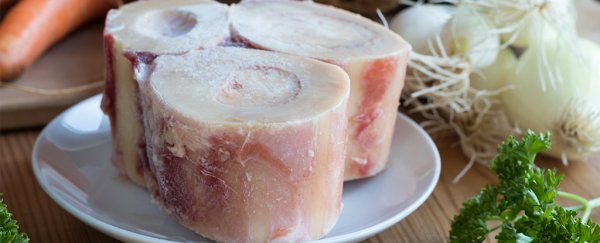No longer satisfied with injecting it into tired-looking, wrinkled skin, an increasing number of people are buying collagen in a powdered form to chow down as the newest fad in superfoods.
For a while it's been popular in the form of a 'paleo diet' meal, bone broth. But now we're starting to see desiccated connective tissue as an ingredient in snacks and drinks.
This isn't small beans either. There are roughly 300 products on the market advertising collagen additives, with sales estimated to have reached US$60 million over the past year.
What gives?
As with most health fashions, the truth can be hard to unpack, but here's what you need to know.
Collagen is a group of fibrous structural proteins that help hold your body's tissues together, and it's found everywhere from your skin to your tendons to your bones.
As a protein, our body makes it by sticking amino acid units together into long strings.
If you're a meat-eater, you're probably eating plenty of these amino acids already. Your body breaks the collagen down in your gut and reuses its pieces to build more proteins of different shapes and varieties.
Plants don't make the protein, but they still provide the building blocks necessary to manufacture it.
As with any supplement, eating more nutrients in the hope of boosting benefits is like thinking you'll get more cars if you just dump more random engine parts onto the production line.
The question comes down to whether the problem – such as old-looking skin or bad joints – is caused by a shortage of those amino acid building blocks on that cellular production line, or something else.
This is where things get complicated. For most people, eating collagen is unlikely to do much of anything. Human bodies evolved to do a lot with a lower variety of food than even relatively bad diets have today, so chances are you're well stocked on those amino acids.
That's not to say there aren't a number of people who just might benefit from a few more of collagen building blocks in their dietary intake.
A double-blind study published in 2014 did find a significant enough difference in skin elasticity of around 50 middle-aged women who added a few grams of collagen to their daily diet over a couple of months.
Last year, a study conducted on mice also found the potential for benefits.
But before you mistaken a few positive results for a green light to stock up on vanilla-flavoured collagen bars, it's important to note that a selection of promising studies doesn't equal an endorsement.
For one thing, there just isn't a lot of robust, replicated research on the topic, leaving plenty of room for debate over the details.
Much like the hype over antioxidants, a few cherry-picked studies can be stretched out of proportion when turned into a marketing brand.
Even if such conclusions turn out to be correct, there is nothing solid pointing the way to an underlying mechanism, or highlighting potential risks of overconsumption.
Could a small change in diet could produce better (not to mention cheaper) results? How does excess collagen affect gut microflora?
Lastly, food fashion risks opening the door to unscrupulous vendors taking an opportunity to get in while the market is hot.
Regulation is key here, and without a careful eye on where this load of ground-up connective tissue is being sourced, it's hard to say what else is going into those shakes and health snacks.
The bottom line is – we just don't know enough. Scientifically speaking, the hype doesn't match the hope, so it's a case of buyer beware. Even in the best case scenario most people who seek out collagen additives in their health snacks won't see a return on their investment.
But if you're sold on giving it a go, don't let uncertain science stand in your way of consuming ground-up connective tissue. Bon appétit.
